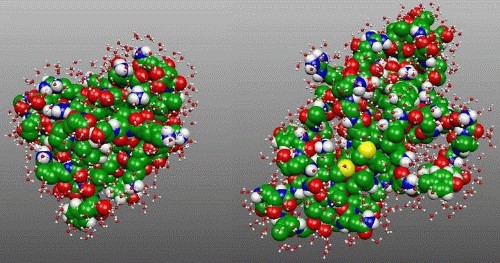|
Current News |
|
Chemistry A to Z |
|
About Internetchemistry |
|
- Imprint |
|
|
Protein Folding Modifies the Water in the Environment |
|
Just a few weeks ago, teams from Bochum, Illinois, and Nevada were able to prove with terahertz (THz) spectroscopy that proteins do modify water molecules in their environment to a long range extent: The water molecules, which generally move around like disco dancers in their collective network motions behave more like in a neat minuet under protein influence. The group by Prof. Dr. Martina Havenith-Newen (Physical Chemistry II Dpt., RUB) managed to find out more about the rules of this dance. They could show that protein folding changes the dancing steps of the water. A partly unfolded protein will affect water molecules within the dynamical hydration shell to a much less extent than a folded one does. The higher the flexibility of the protein, the less affected is the water. The scientists present their conclusions as a "communication" in the Journal of the American Chemical Society. |
|
|
Protein Creates Order in Water In water, weak bonds between two adjacent water molecules, referred to as the hydrogen bridge bonds, are continuously opening and closing: this happens on average every 1.3 pico seconds (one pico second = 10 power -12 seconds). "Even small concentrations of proteins in water lead to measurable changes in collective movements", Prof. Havenith-Newen explains the results of previous studies with THz spectroscopy.
The Folding is the Important Thing While the folded protein affects up to 1,000 water molecules in its environment, this is only true for the partly unfolded protein to a small extent. If one modifies some parts of the protein through mutation, the effect is less remarkable. These observations were now made by the scientific teams of Prof. Havenith-Newen, Prof. Dr. Martin Gruebele, and Prof. Dr. David M. Leitner from RUB, the University of Illinois and the University of Nevada, respectively. "This shows that water in the environment of folded proteins is different from that in the environment of an unfolded protein", Prof. Havenith-Newen concludes. "This will further support the hypothesis that protein and water are not independent of each other and do influence each other - an effect which has been considered decisive for protein folding, and which may be highly important for protein functions."
New, Highly Precise Method of Proof THz spectroscopy is a new, especially sensitive method of observing fast water network movement in the close vicinity of proteins with the THz frequencies ranging between microwave and infrared frequencies. Particularly strong THz laser radiation sources lasers, which has been used in chemistry for the first time by RUB, facilitates the observation of proteins in their natural environment during their fast dance with water molecules. The studies which have been published in the Journal of the American Chemical Society were financed by the Human Frontier Science Programme. Martin Gruebele has stayed at the RUB Chemistry Department after being awarded the Friedrich Wilhelm Bessel prize of the Alexander von Humboldt foundation. |
|
|
|
|
Related topics - search form: |
|
|
